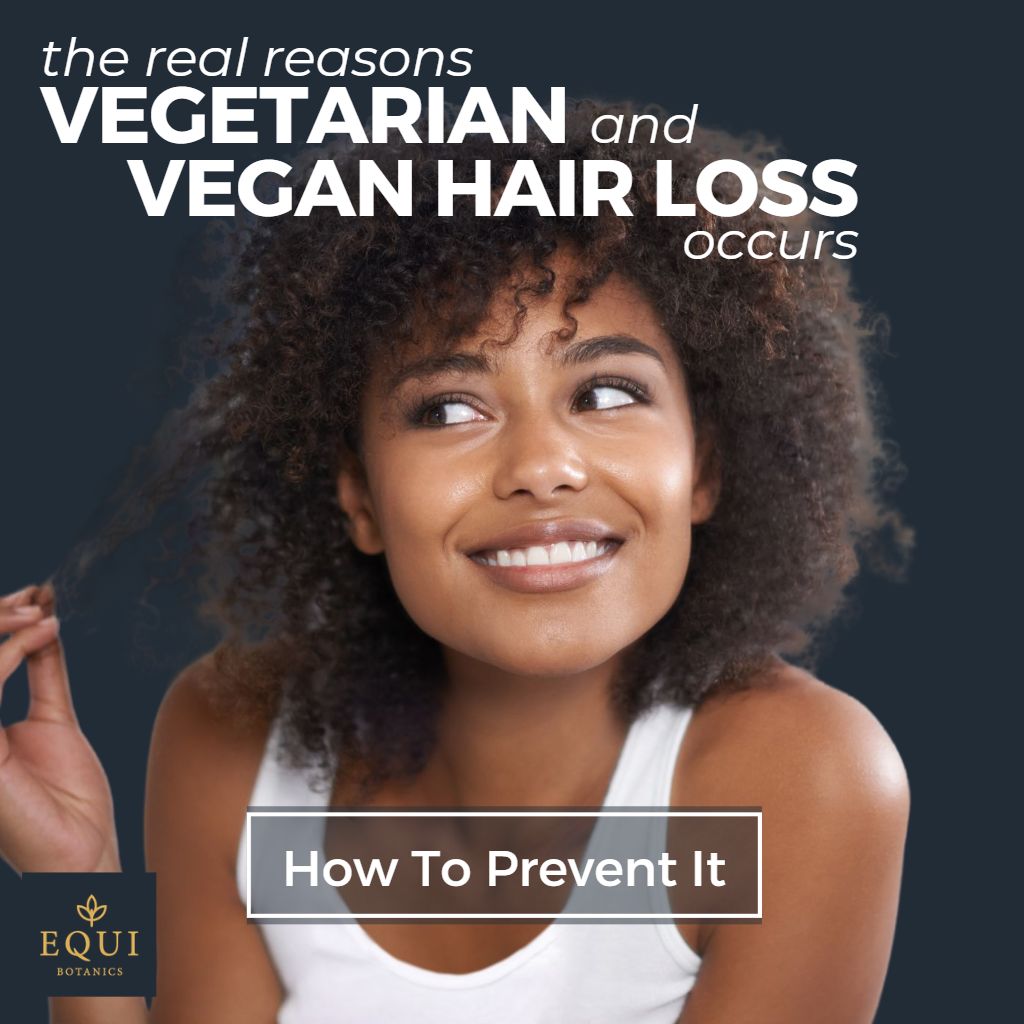
The rising trend of veganism and plant-based diets doesn’t seem to be going anywhere anytime soon. Recent research by YouGov has shown that, in the UK, the vegan population has risen from 2% to 7% over the past two and half years, with this figure continuing to increase. With this rise, however, has come an increase in the number of reports of hair loss that have been attributed to this more nature-friendly diet.
Following a vegan diet does put you at higher risk of hair loss, and whilst vegans are less likely to go bald completely, the diet itself lacks essential nutrients, such as protein, iron and zinc, that are needed to keep hair thick and healthy.
Of course, to prevent hair loss, you won’t need to give up your vegan way of life; it simply requires some adjustments to your diet to increase your nutrient levels. This can be achieved either through supplements or food sources, to ensure your hair is at optimum health levels and shedding is reduced. First, then, let’s look at the reasons behind hair loss in vegetarians and vegans.
Reasons for Hair Loss on a Vegan Diet

The most likely cause for vegan or vegetarian hair loss is a lack of nutrients that are essential for healthy hair. Not sure what nutrients your diet could be lacking? Read on and we’ll give you the lowdown on all you need to know!
1. Iron
Cutting out meat from your diet can lead to an increased risk of iron deficiency, otherwise known as anaemia. This is because meat contains heme iron which is better absorbed by the body – around 20% – in comparison to non-heme iron which has around a 7% absorption rate.
Plant-based eaters can still get their recommended daily allowance of iron by eating plenty of non-heme rich plant foods such as nuts, spinach and whole grains. Iron helps with the body’s production of haemoglobin which carries oxygen to cells, including those used for hair growth.
2. B12
Vitamin B12 is an essential vitamin that helps to build and maintain red blood cells, hormones and energy levels within the body. It’s also important for hair as this vitamin helps to carry oxygen to the hair follicles to encourage growth.
A lack of B12 in your diet is known to cause hair loss but also a dry scalp. The best way to increase your intake of this is to take a daily supplement. This is because it’s hard to absorb this vitamin through vegan food sources alone.
3. Biotin
Biotin is a word often heard when it comes to haircare and for good reason; this nutrient which is a member of the B vitamin family, stimulates keratin production and increases the rate of hair follicle growth.
In a recent survey carried out by the International Journal of Trichology, it was found that 38% of women with hair loss were revealed to have a biotin deficiency. It’s clear, therefore, that this nutrient has a big role to play when it comes to hair loss.
Your body produces some biotin but sadly not enough to support your hair health. It’s also a nutrient that predominantly comes from animal-derived foods which can be a reason why vegans don’t get enough biotin in their diet. There are some vegan-suitable sources, however, such as:
- Sweet potato
- Cauliflower
- Peanuts (including peanut butter)
- Onion
- Tomato
- Avocado
- Nutritional Yeast
Top tip: Look for Vitamin B7 on food labels to know whether it is a good source of Biotin!
4. Zinc
Another common nutrient deficiency when on a vegan diet is Zinc. As well as contributing to hair loss, a lack of zinc can also cause dry skin, brittle nails and result in more frequent colds.
Some plant-based foods contain phytic acid which is an anti-nutrient that binds to zinc and prevents absorption. To counteract this, somebody on a vegan diet will need to eat around 50% more zinc to ensure appropriate absorption.
Taking a zinc supplement and eating zinc rich foods such as seeds and whole grains will help to increase zinc in your diet but be sure to prepare it correctly to maximise absorption and counteract any issues faced from the presence of phytic acid.
5. Cysteine

Much like biotin, if you’re into your hair care and maintenance, then you’ll almost certainly have heard of keratin. Keratin is a hair protein that’s essential for hair growth and to make it, you need cysteine. Cysteine makes up 14% of the keratin protein and if you don’t have enough of it, your hair strands will become brittle and weak. Think of cysteine as the glue that holds your hair together!
Keep on top of your cysteine levels by making sure you are eating plenty of protein every day. Good sources of vegan protein include lentils, tofu, couscous, walnuts and chickpeas.
Like many nutrients and vitamins, you can also take a supplement to increase your cysteine levels. A study by the Journal of Cosmetology found that taking a cysteine supplement can improve hair growth rate by as much as 50%. This suggests a supplement is better for those on a vegan diet rather than a food source in this instance.
6. Lysine

Lysine works to increase collagen production which provides a foundation for healthy hair growth as well as helping hair elasticity. As an amino acid, Lysine is not something the body can make itself; it must be gained from food sources. Beans and pulses are high in Lysine and, as such, you should aim to eat these every day to maintain Lysine levels.
7. Selenium
Selenium is a mineral that helps to support immune system functioning, energy levels and thyroid health. However, you can have too much of it. Selenium toxicity can cause nausea and vomiting, brittle nails, fatigue and hair loss.
As the body can’t get rid of excess selenium easily, it tries to eject it via your hair and digestive tract which is why common symptoms include hair loss and vomiting. Regularly consuming Brazil nuts can contribute to selenium toxicity so try to keep to a strict 2-a-day rule if you enjoy eating them.
8. Protein
When switching to a plant-based diet you may not consider how not eating meat affects hair, but hair loss in vegetarians and vegans is a common issue when avoiding meat as it can affect the level of protein in your diet. Hair fibres are made up of between 80-95% protein so a reduction in the intake of this in your diet can cause hair fall.
How Do You Avoid Hair Loss on a Vegan Diet?

Unfortunately, veganism is a nutritionally restrictive diet and not eating meat can cause hair loss. However, this is only if the vitamins and nutrients you would get from doing so are not replaced within your vegan diet. It’s entirely possible to be on a plant-based diet and avoid hair loss, as well as reverse any damage that might have occurred, as long as you supplement your diet with previous missing nutrients, and follow the steps below:
Diet Changes
If you’ve already experienced vegan or vegetarian hair loss, then don’t worry because it will grow back with the correct treatment. Follow these steps to support your plant-based diet and hair loss:
- Book for a blood test with your doctor to check for both iron and B12 deficiencies.
- Take a vitamin and nutrient supplement designed for vegan hair loss and health.
- Change your diet to include foods rich in zinc, B vitamins and iron.
- Hit your recommended daily allowance of protein.
- Monitor your intake of selenium and reduce it if necessary.
If you’re looking for foods that help hair grow thicker, consider introducing the following vegan friendly options:
For iron: lentils, spinach, nuts, seeds, dark chocolate and skin-on potatoes
For protein: nuts, beans, soy-based products, quinoa, nutritional yeast and vegan protein powders
For zinc: pumpkin seeds, cashews, almonds, chickpeas and kidney beans
For biotin: peanuts, rolled oats, mushrooms, avocado and seeds
For lysine: tofu, soy beans, chickpeas, kidney beans and lentils
For cysteine: soy, nuts, seeds and oatmeal
There are also some foods that are good to avoid as they can contribute to hair loss – dairy, for instance. Many believe that cutting out dairy causes hair loss but with the high levels of fat found in dairy items, this can increase testosterone levels which can cause hair fall as well as scalp conditions such as dandruff and psoriasis, which can also exacerbate hair loss issues.
Medical Treatment
Although the most effective way to treat your vegan or vegetarian diet-related hair loss is to treat vitamin and nutrient deficiencies, if you have particularly noticeable or severe hair loss, you may want to consider consulting your doctor.
As diet-related loss isn’t caused by medical reasons many doctor-prescribed treatments will be ineffective. There is, however, a topical hair loss medication, Minoxidil, that works to improve blood flow to the scalp and stimulate hair follicles which, in turn, can speed up re-growth. If you are keen to stick to a more natural resolution, then opt for a plant-based, stimulating hair care products instead.
Vegan Hair Loss Products
A great way for vegans to keep their hair healthy is to switch up products. It can be hard to find good quality hair care ranges that are vegan friendly, but many naturally-derived formulas will be suitable. One natural ingredient that is ideal to introduce if you are a vegan wanting to make their hair thicker or regrow after loss is black seed oil.

Black seed oil contains multiple nutrients that support hair and scalp health. Known for its hair regrowth abilities, this oil is both anti-fungal and anti-bacterial and works to moisturise the scalp as well as increase blood circulation which encourages regrowth. Using a product such as the Black Seed Oil Hair Elixir, which has high levels of thymoquinone, will strengthen your locks, promote growth and help to prevent further loss and reduce vegan hair thinning.

To promote regrowth, it is also important to keep your scalp in tip top condition. The good news with vegan or vegetarian hair loss is that it will grow back but by keeping your scalp healthy and hydrated you ensure that you have a good base for the hair to grow. Using a range of sulphate-free, naturally-derived products such as The Standard Package will help to promote growth, sometimes in as little as three weeks, but also keep existing hair hydrated.
To conclude
Vegan thinning hair is a common side effect of switching to a plant-based diet but better management of vitamins and nutrients essential for healthy hair as well as introducing some hair loss specific, vegan formulated, hair care products will help vegans to keep their hair healthy and reverse hair loss.


